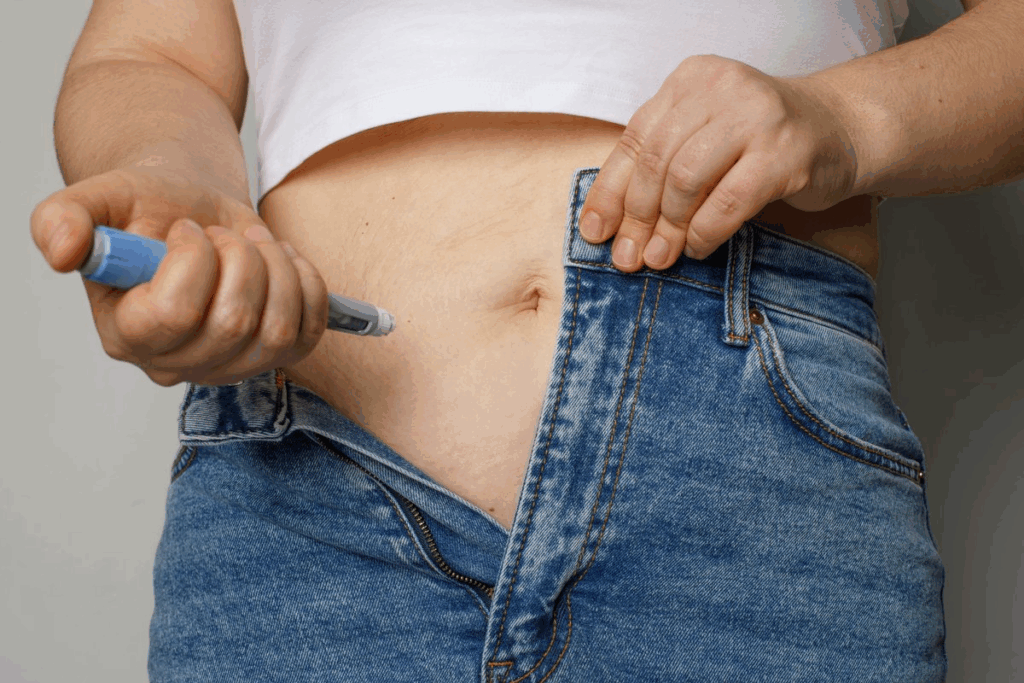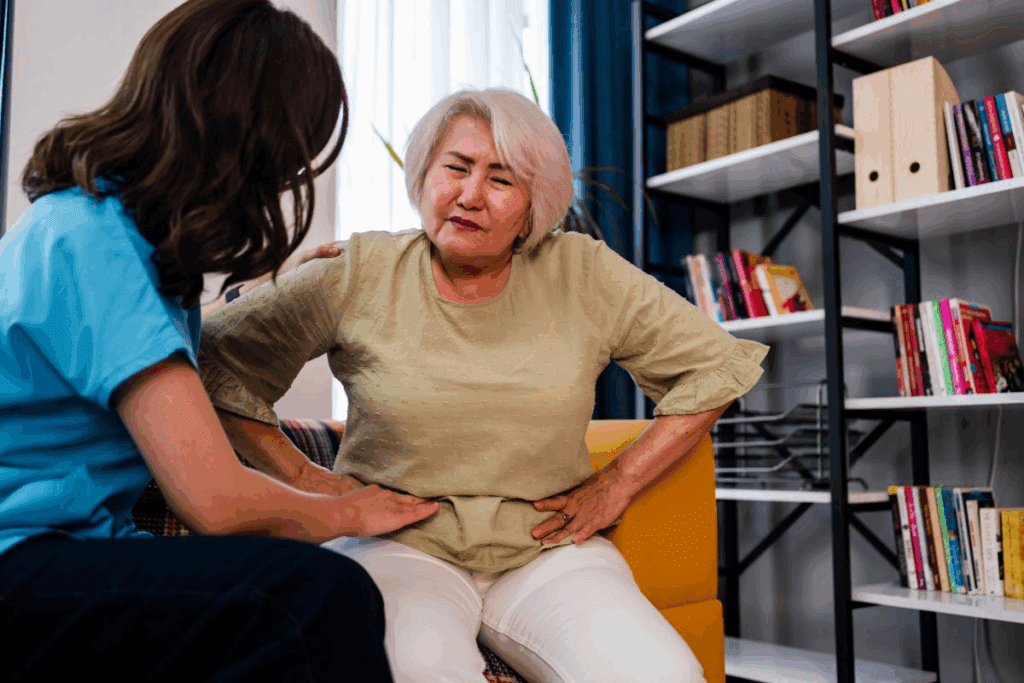Last Updated on November 26, 2025 by Bilal Hasdemir

Gallbladder removal, or cholecystectomy, is a common surgery for gallstones and gallbladder disease. Weight loss after gallbladder removal is a big worry for many. Studies show that how gallbladder removal affects weight loss differs for everyone.
Some people see temporary weight loss after gallbladder surgery because of diet changes and less hunger.is it harder to lose weight without a gallbladderAnemia Can Cause Weight Loss: Serious Facts to Know At Liv Hospital, they help patients through every step. They focus on safe and effective weight management, putting the patient first.

It’s important to know how the gallbladder works and what happens when it’s removed. The gallbladder is a small organ under the liver. It’s key to our digestive system.
The gallbladder holds bile from the liver. It sends bile to the small intestine to help with fat digestion. Bile breaks down fats into smaller pieces for better digestion.
Without the gallbladder, fat digestion changes. The liver keeps making bile, but it flows into the small intestine all the time. This can affect how we digest fats.
Cholecystectomy, or gallbladder removal surgery, treats gallstones and diseases. There are two main types: laparoscopic and open. Laparoscopic uses small incisions and a camera. Open cholecystectomy has one big incision.
Laparoscopic surgery is faster, with most people back to normal in a week. Open surgery takes longer, often weeks.
The main reason for gallbladder removal is gallstones. These small, hard deposits can cause pain and infection. Other reasons include inflammation, polyps, and cancer.
Knowing about gallbladder function and removal helps us make better health choices.

After gallbladder surgery, weight changes are common. These changes come from how digestion works and how hungry you feel. People often lose weight first, but may also feel some discomfort in their stomach.
Weight loss right after surgery is common. It’s mainly because of changes in what you eat and how much you want to eat. A study in the Journal of Gastrointestinal Surgery found that many patients lose weight in the first weeks. This is because they eat less and their eating habits change.
How long this weight loss lasts can vary. Several things can affect this:
One patient said, “I lost about 10 pounds in the first month after surgery. This was mainly because I had to change my diet a lot.”
This weight loss at first might seem good, but it’s not always a lasting solution.
What you can and can’t eat after surgery affects your weight. Doctors often tell patients to eat less fat to avoid stomach problems. Eating less fat means you eat fewer calories, which can lead to weight loss.
| Dietary Component | Pre-Surgery | Post-Surgery |
| Fat Intake | Normal to high fat | Low fat |
| Meal Frequency | 3 main meals | 5-6 smaller meals |
| Food Texture | Varied | Soft, easy to digest |
It’s important to handle stomach problems to keep your appetite up and get enough nutrients. Symptoms like diarrhea, bloating, and discomfort from fatty foods are common.
To deal with these symptoms, you can:
By using these strategies, you can manage your stomach problems better. This helps with your weight management too.
Removing the gallbladder changes how bile flows, which can make losing weight harder. After surgery, bile goes straight to the small intestine. This might affect how well the body digests and absorbs fats.
This change can make it harder to lose weight, but how much it affects you can vary. Knowing this is key to finding ways to lose weight after surgery.
Studies on losing weight after gallbladder removal show mixed results. Some say bile flowing into the small intestine can change fat metabolism. This makes losing weight harder for some people.
A study in the Journal of Gastrointestinal Surgery found changes in lipid profiles after surgery. This could affect managing weight.
Key findings from recent studies include:
After gallbladder removal, bile flows continuously into the small intestine. This changes how the body processes fats. Bile helps break down fats, making them easier to digest and absorb.
Without a gallbladder, bile stays in the intestine, aiding in fat digestion. But, this doesn’t always mean it’s easier to lose weight. The effect on fat metabolism varies. Some people might absorb fats better, while others might struggle with digestion.
| Aspect of Fat Metabolism | Pre-Cholecystectomy | Post-Cholecystectomy |
| Bile Release | Triggered by meals, stored in gallbladder | Continuous flow into small intestine |
| Fat Digestion | Efficient during meals | Constant, potentially more efficient |
| Weight Loss Challenges | Varies, influenced by diet and metabolism | Can be more challenging due to altered bile flow |
People react differently to gallbladder removal. Diet, lifestyle, and health can greatly affect weight loss after surgery.
Some manage their weight well with diet and exercise. Others face bigger challenges.
Personalized weight management plans can help achieve weight loss goals without a gallbladder.
Many think gallbladder removal leads to weight loss. But, it’s not that simple. Weight changes after surgery depend on diet, lifestyle, and how the body reacts.
The idea that gallbladder removal means automatic weight loss is wrong. Some people might lose weight, but others won’t. The initial weight loss is often from pre-surgery diet and recovery, not the surgery itself.
Studies show weight loss after gallbladder removal depends on many things. This includes how bile and fat digestion change. Some might get diarrhea or fatty stools, affecting how well they absorb nutrients and leading to weight changes.
Some gain weight after gallbladder removal for several reasons. They might eat more calories after surgery. Others might feel hungrier or have a different metabolism, leading to weight gain.
A study in a medical journal showed different weight changes after surgery. Here’s what they found:
| Weight Change | Percentage of Patients |
| Weight Loss | 30% |
| No Significant Change | 40% |
| Weight Gain | 30% |
It’s important to know the difference between correlation and causation. Just because weight changes happen after surgery, it doesn’t mean the surgery caused them. Lifestyle and health conditions also matter.
Understanding how gallbladder removal, diet, and body changes interact is key to managing weight after surgery. By eating well and living healthily, people can reach their weight goals.
Removing the gallbladder changes how the body handles weight. Without the gallbladder, bile flow changes. This affects fat digestion and absorption.
After gallbladder removal, bile flows straight to the small intestine. This changes fat digestion. The body can’t store and release bile as it used to.
This can cause impaired fat absorption. It might also lead to digestive issues like diarrhea or fatty stools. These problems can affect how well nutrients are absorbed.
Studies show gallbladder removal can change the gut microbiome. The constant flow of bile into the intestine can upset the balance of gut bacteria. This might affect how the body manages weight.
An imbalance in gut bacteria, or dysbiosis, can impact weight and metabolic health. Keeping the gut microbiome healthy is key for those who have had their gallbladder removed.
The changes after gallbladder removal can affect hunger and metabolism. Altered digestion and absorption can change hormone levels. Hormones like cholecystokinin (CCK) and peptide YY (PYY) help control hunger.
Changes in the gut microbiome also play a role. They affect the production of short-chain fatty acids. These acids are important for energy and appetite control. Understanding these changes is vital for managing weight after gallbladder removal.
After gallbladder removal, losing weight depends on the right diet. Without a gallbladder, fat digestion changes. So, choosing the right foods is key for managing weight and health.
Without a gallbladder, bile flows constantly, making fat digestion hard. It’s best to eat fats in small amounts. Focus on healthy fats like those in avocados, nuts, and olive oil.
When you eat fats matters too. Eating fats at different times helps digest them better and absorb nutrients.
Key considerations for fat intake:
Planning meals is vital for weight loss after gallbladder removal. Eating smaller meals often helps manage digestion and aids in weight loss. Balance meals with protein, healthy fats, and complex carbs to keep energy stable and prevent hunger.
Tips for effective meal planning:
Some foods are great for digestion and weight management after gallbladder removal. Foods high in fiber, like fruits, veggies, and whole grains, help with bowel movements and weight loss. Lean proteins and omega-3 rich foods also support digestive health.
Beneficial foods include:
After gallbladder surgery, the right exercise can help a lot with weight loss and health. Regular activity supports weight control and boosts digestion and metabolism.
When to exercise after gallbladder surgery matters a lot. It’s best to exercise on an empty stomach or 2-3 hours after eating. But, listen to your body and adjust your schedule as needed.
A good exercise plan should include cardio, strength training, and flexibility exercises. This mix supports health and weight loss.
Some good exercises are:
Slowly increase the intensity and duration of your workouts. This helps your body adjust without stressing your digestive system. Start slowly, even in the early stages after surgery.
By adding a thoughtful exercise plan to your life, you can boost weight loss and overall health after gallbladder surgery.
After having your gallbladder removed, you might need to try different supplements and medications. This is because your body’s fat digestion changes. This can lead to digestive problems.
Digestive enzymes and bile salts can help with digestion after gallbladder removal. Digestive enzymes break down food into smaller parts. Bile salts make fats easier to digest.
These supplements are great for high-fat meals. They can reduce bloating, diarrhea, and stomach pain. Always talk to a doctor about the right dosage and type.
Probiotics are good bacteria and yeast for your gut. They help keep your gut healthy after gallbladder removal. Probiotics can improve digestion and reduce IBS symptoms.
In some cases, you might need medication for symptoms that don’t go away. For example, bile acid sequestrants can help with bile acid malabsorption after gallbladder removal.
It’s important to work with your doctor to find the right treatment. Medications should only be taken as directed by a healthcare professional. This helps avoid side effects and interactions.
After gallbladder surgery, losing weight can be tough. People often face unique hurdles that slow down their progress. Knowing these challenges and finding good ways to tackle them is key to lasting weight loss.
Diarrhea and stomach upset are common after gallbladder surgery. To handle these issues, changing your diet is important. Lowering fat intake can help with diarrhea, as your body has trouble digesting fats without a gallbladder. Also, eating smaller, more frequent meals can make digestion easier and reduce stomach pain.
Some people might find it helpful to add digestive enzymes or bile salts to their diet for better fat digestion. But, always talk to a doctor before starting any new supplements.
Weight changes are normal after gallbladder surgery. They can be due to diet changes and metabolism shifts. To manage these changes, it’s important to keep track of your weight and adjust your diet and exercise as needed.
Building lasting habits is essential for successful weight loss after gallbladder surgery. This means eating a balanced diet and staying active.
By using these strategies and staying consistent, people can beat common weight loss hurdles and reach their goals even after gallbladder surgery.
Loosing weight without a gallbladder needs a mix of diet changes, exercise, and sometimes supplements or meds. The path to managing weight after gallbladder surgery is complex. It’s affected by how fat is digested, nutrients are absorbed, and the gut’s health.
It’s not that losing weight is harder without a gallbladder. It’s just that you need a plan that fits you. Eating the right fats, planning meals, and choosing foods that aid digestion can help. Also, exercising regularly, focusing on digestion and metabolism, is key.
With the right lifestyle changes and, if needed, medical help, losing weight after gallbladder surgery is possible. Being informed and taking action can help you overcome obstacles and reach your weight goals.
Removing the gallbladder can cause short-term weight loss. This is because of changes in diet and appetite. But, it doesn’t guarantee long-term weight loss.
Yes, losing weight after gallbladder removal is possible. But, it needs a good diet and exercise plan.
After the gallbladder is removed, bile flows constantly into the small intestine. This can change how fat is digested and absorbed. It might affect your weight.
To lose weight without a gallbladder, focus on the right amount of fat. Plan your meals well. Choose foods that help with digestion.
Yes, exercise can help with weight loss and health after surgery. It’s important to exercise at the right times to feel comfortable and effective.
Digestive enzymes, bile salts, and probiotics can help with digestive issues after gallbladder removal. They support gut health.
Some people gain weight after surgery because of changes in fat digestion and nutrient absorption. The gut microbiome also plays a role.
To manage diarrhea and discomfort, change your diet. Avoid foods that trigger issues. Eat smaller meals.
Losing weight without a gallbladder can be tough. But, with a good diet and exercise plan, you can reach your goals.
The long-term effects of gallbladder removal on weight vary. A sustainable diet and exercise routine are key for success.
Yes, gallbladder removal can cause weight fluctuations. This is due to changes in digestion and nutrient absorption.
Subscribe to our e-newsletter to stay informed about the latest innovations in the world of health and exclusive offers!